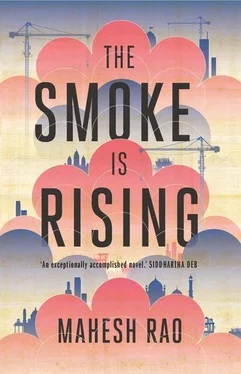Six partitioned surfaces holding computer monitors had been crammed into the tiny area. The room had no windows and the only light was the murky indigo flicker from the grimy screens. The woman pointed at a computer in the corner and returned to her own screen. Girish squeezed into the space indicated and began his circuit. He had an email from his credit card company, one from Indian Railways and one from a colleague sending on a tedious list of differences between ‘the smart Indian man’ and ‘the smart Indian woman’. He moved on to various news websites, barely absorbing the first few lines of a story before clicking on another link. Then he checked into a couple of motoring websites.
There was a knock on the door and the girl pushed her chair back with a screech. This time she had a hurried conversation with someone wearing a baseball cap and returned to the gloom of her station. A mosquito dived past his ear with its urgent whine. He once again resolved to buy a computer before the end of the following month. It was simply untenable that he should continue to come to this rank hole and pay money for the privilege.
Girish had profiles on three social networking sites, all featuring the same brief account. A couple of allusions to his seniority were buried in the short description of his career; there were half a dozen photographs taken during his honeymoon in Ooty; and he had added a list of interests which probably had contained elements of veracity at some point. He had no idea why he even logged on to these sites any more. They had brought neither stimulation to his social life nor favour in his career. As a creature of habit, he supposed that it was just something else that he had built into his routine. He did occasionally like to catch up on the current status of ex-colleagues and college mates. The truth was that he probably scrutinised their profiles a little more than occasionally; quite a bit more. But then wasn’t that what these websites were for? To present a palatable record of your own life and to gawk at the signposts planted by your peers?
According to Mohit Joshi’s profile he was now based in c, in charge of IT systems for a finance company. There he was posing in front of a fountain on Sentosa Island with his fat wife and lumpy kids. He had apparently decided that he was of American stock. His latest post began: ‘Hey wassup dudes! Howsit hanging?!’ This was from a man who had not left Firozabad until he was nineteen. Mohit’s friends on the website seemed to be similarly deluded simpletons, fleshy calves emerging from khaki shorts at various recreational locales.
A few weeks ago, Girish had been surprised to discover that Abhijit Dutta was now some big-shot television producer in Delhi. In fact, Girish had only thought of looking him up online when his name had flashed up on the credits of a programme on Star One. In a bored moment Girish had wanted confirmation, and Abhijit had popped up in at least twenty-five pages of Google hits. He had certainly moved on from the affable but nondescript entity he had been at university.
Girish’s recollections of his time at university always fixed him at the centre of a charismatic group with a keen sense of purpose. He had chosen to go to a well-regarded college, part of Delhi University, wanting to escape the reach of his provincial background. But once settled in his cheerless shared room in the men’s hostel, surges of panic had begun to break over him. Faced by the adamant indifference of college cliques, sequestered in an alien city, for the first time he had cause to question his assumed route to success.
Some months later, a more senior student had come to Girish’s rescue, spotting him at a debating society meeting. A final year mathematician, active in student politics, he had begun shepherding Girish to meetings and rallies, gabbling into his face every time a local party bigwig made an appearance on campus. At first Girish had gratefully tailed his new mentor, hugely relieved at this turn of events. The appearance of energetic activity that marked out the student politicians gave him an identity that he craved, in the face of the wealthier and more confident undergraduates who snaked around the campus. They were able to procure first day, first show balcony tickets at any cinema and tease out knowing laughter from girls in bright churidars at the local eateries. Girish had come to take his academic excellence for granted and needed some other insignia in that unfamiliar new world.
In time, he had become more actively involved in student politics, persuaded by his new circle that his contribution would be essential. He knew he could speak well (or, as he preferred, ‘orate’) and it was the admiration and exhortations of his associates, rather than any natural ambition or ideology, that was the impetus to his political activities. He began by absorbing the methods of the student union apparatchiks. The murky patterns of patronage and intimidation practised by the mainstream parties were reflected within the student union factions, abetting the rise of a number of muscular political personalities on campus. A student organisation affiliated to a major party would identify particular colleges where block votes could easily be delivered. It would then attempt to manipulate admissions procedures there to ensure that efficient student campaigners would gain entry to the college.
The political causes espoused at these colleges were becoming increasingly circumscribed: agitation for the reversal of college disciplinary sanctions against a student union official; a forced boycott of lectures following the announcement of inopportune union election dates; and protests demanding the release of an election candidate, arrested for unlawful possession of firearms. Girish quickly came to understand the nature of these operations but was untroubled by their complexion or by the alternate voices within the student community calling for a union clean up. The practice of politics was dirty and there was little to be gained from being blind to that fact. Girish was now speaking eloquently before appreciative audiences, was involved in strategy meetings and writing speeches for campus heavyweights. This was the real draw.
In Girish’s final year, rumblings began to sound that the government was finally going to implement the recommendations of the Mandal Commission: the introduction of quotas for ‘backward’ classes for recruitment to public sector jobs and admission to government universities. The proposed extension of the state’s affirmative action policies meant that almost half of all government jobs and university places were to be reserved for members of lower castes. It did not take long for the college student body’s position to become clear, dominated as it was by upper castes. The organisations on campus were, however, getting mixed signals from the major political parties, who were unsure where to nail their colours, still debating whether the proposals amounted only to inconsequential government bluster. In a change from the usual internal politicking, rival student organisations began to come together to protest against the Mandal recommendations, convinced that upper caste youth were being dispossessed of the opportunities that were available to them.
Girish suddenly found himself in a widening fissure, a situation that demanded action. His participation thus far had seemed almost abstract, his interests lying in the execution rather than in the achievement. Now as demonstrations and walk-outs began to gather momentum across North Indian universities, Girish and his peers were called upon to articulate a very specific opposition to this new wave of social reconstruction.
Girish had always known that as a Brahmin of limited means, he would have to be the product of his own diligence and resourcefulness. This had never been a concern as he was secure in his assessment of his academic abilities and had begun to believe in the mantra of merit and efficiency that would finally open doors in a secular, democratic India. Caste was not a factor that needed to feature in these calculations. Its natural habitat was the remote feudal dust plains and tribal thickets of a different modernity. For Girish, caste had become a personal matter, a private cultural identity bound up only with the desultory practice of rituals in the kitchen and the pooja room.
Читать дальше












